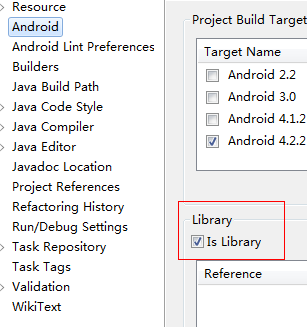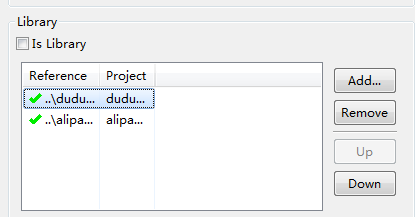Android学习笔记_71_Android 多个项目之间如何引用 项目怎样打jar包
一、将整个项目作为资源文件
1、需要将被应用的项目设置为库项目。

2、将该项目的配置文件中的四大组件清空,例如下面代码:
<?xml version="1.0" encoding="utf-8"?> <manifest xmlns:android="http://schemas.android.com/apk/res/android" package="com.baidu.cn" android:versionCode="1" android:versionName="1.0" > <uses-sdk android:minSdkVersion="8" android:targetSdkVersion="17" /> <application android:icon="@drawable/icon" android:label="@string/app_name" > </application> </manifest>
3、将四大组件的内容移动到主项目的配置文件中,将assets目录 libs目录下的文件也要移动过去。
4、在被引用的项目作为库项目导入到主项目中,通过 " 右键-》属性-》android-》add "就可以导入。如果被导入的项目也依赖其他库项目,那么该项目不需要导入其他库项目,将所以的库项目放到主项目中去。

5、注意事项:
5.1、库项目和主项目需要最好放在同一个工作空间下,不用从其他工作空间引用,否则上面显示的库项目有个红叉。
5.2、库项目不能在有自己定义的Application,可以将数据保存到单例类里面。
5.3、启动activity时,还是在库项目中启动,这是主项目只需要传递上下文对象和基本参数信息即可。就不会出现找不到activity的错误。
二、将项目打成jar包
将项目1的src(后台源码)目录下的文件打成jar包,重新建立一个项目2,然后将刚打成的jar包拷贝到项目2libs目录下,将项目1所有的资源文件(比如drawable,values,layout等资源目录)拷贝到项目2对应的目录下,将项目2作为资源文件就可以引入到其他项目中了,这样的好处是不对外暴露源码。
有两种方式完成后台代码与前端文件映射:
1、通过反射
public class MResource { private static final String TAG = "MResource"; public static int getIdByName(Context context, String className, String name) { String packageName = context.getPackageName(); Class r = null; int id = 0; try { r = Class.forName(packageName + ".R"); Class[] classes = r.getClasses(); Class desireClass = null; for (int i = 0; i < classes.length; ++i) { Log.i(TAG, ": "+classes[i].getName()); if (classes[i].getName().split("\\$")[1].equals(className)) { desireClass = classes[i]; break; } } Log.i(TAG, ": "+desireClass.getName()); if (desireClass != null) id = desireClass.getField(name).getInt(desireClass); Log.i(TAG, "ID : "+desireClass.getName()); } catch (Exception e) { e.printStackTrace(); } return id; } }
2、简单映射
2.1、需要将项目2的R文件映射
public class ResourceMap { public static final int getAnim_alpha_show=R.anim.alpha_show; public static final int getAnim_translate_left_out=R.anim.translate_left_out; public static final int getAnim_translate_right_in=R.anim.translate_right_in; public static final int getArray_payment_moneys=R.array.payment_moneys; public static final int getArray_payment_moneys_text=R.array.payment_moneys_text; public static final int getArray_payment_types=R.array.payment_types; public static final int getColor_backgroundcolor=R.color.backgroundcolor; public static final int getColor_black=R.color.black; public static final int getColor_blue=R.color.blue; public static final int getColor_daoju_color=R.color.daoju_color; public static final int getColor_gray=R.color.gray; }
2.2、将项目2引入到项目1中,将类似R.color.gray替换成getColor_gray。可以通过搜索R.color.然后将其替换成ResourceMap.getColor_就可以了,同理drawable,anim,id,string都是一样。将项目1下的src(只打包src目录下的文件)打成jar包。
2.3、将项目2作为资源文件。
2.4、将R文件转换成ResourceMap的代码:其中RFile.java文件就是将项目2(与项目1的R文件是相同的,除非在项目2中增加其他额外信息)中的R.java文件内容拷贝其中。需要新建一个Java Project。
package com.example.test; import java.io.BufferedReader; import java.io.File; import java.io.FileOutputStream; import java.io.FileReader; public class ParseRFile { private static String filePath; public static void main(String[] args) throws Exception { //public static int getId_imageView1 = R.id.imageView1; File file = new File("src/RFile.java"); StringBuffer stringBuffer = new StringBuffer(); stringBuffer.append("public class ResourceMap {\n"); BufferedReader reader = new BufferedReader(new FileReader(file)); String lineStr = null; System.out.println("start..."); String className = null; while ((lineStr = reader.readLine()) != null) { lineStr = lineStr.trim(); if (lineStr.contains("public static final class")) { className = lineStr.split(" ")[4]; } if (lineStr.contains("public static final int")) { String[] words = lineStr.split(" "); String filed =words[4].split("=")[0]; stringBuffer.append("\tpublic static final int get"+firstWordUpper(className)+"_"+filed+"="+"R."+className+"."+filed+";\n"); } } filePath = file.getAbsolutePath(); stringBuffer.append("}"); reader.close(); createFile(stringBuffer.toString()); System.out.println(filePath); System.out.println("end ..."); } /** * 首字母大写 * @param word * @return */ public static String firstWordUpper(String word){ String first = word.substring(0, 1).toUpperCase(); String subStr = word.substring(1,word.length()); return first + subStr; } /** * 创建资源文件 * @param source */ public static void createFile(String source){ try { File file = new File("D:/project2/ZJava/src/ResourceMap.java"); if (file.exists()) { file.delete(); } file.createNewFile(); FileOutputStream out = new FileOutputStream(file); out.write(source.getBytes(), 0, source.length()); out.close(); } catch (Exception e) { // TODO Auto-generated catch block e.printStackTrace(); } } }